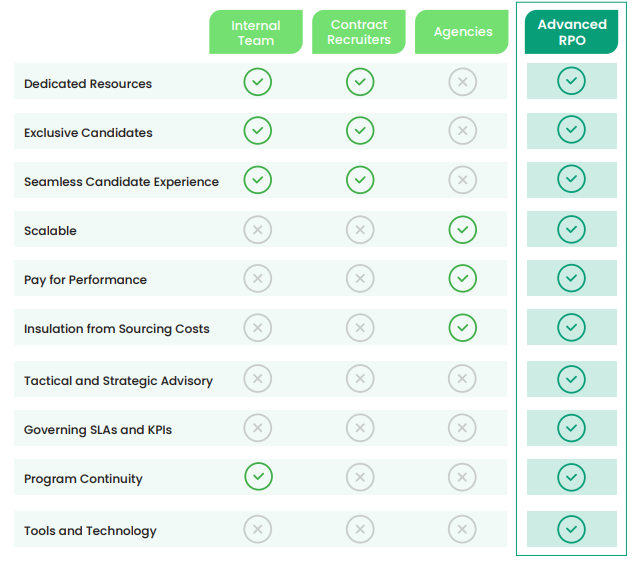What is RPO in recruitment?
The definition: RPO stands for Recruitment Process Outsourcing, a recruiting model where an employer delegates all or part of their hiring process to a partner. RPO adds dedicated recruiting capacity, technology and expertise to HR teams.
An RPO provider can support employers across the recruiting life cycle, from optimized talent sourcing and hiring, through effective onboarding and hiring manager training.
Learn more about RPO:
› How does RPO work?
› Benefits of outsourced recruiting
› Difference from in-house teams & staffing
› Guide to understanding RPO
How does recruitment process outsourcing work?
RPO solutions bring in a team of seasoned experts to optimize and drive your recruiting function. It’s not another staffing solution; RPO goes beyond filling seats. Recruitment process outsourcing is a true partnership.
RPO solutions make it easy to scale your talent acquisition function. You can handle hiring ebbs and flows without putting undue stress on your internal team or simply not keeping up.

Benefits of RPO
Simply put: RPO solutions extend your recruiting capacity right when and where you need it. The outcomes of RPO are measurable and map up to an organization’s business goals. These benefits include:
1. RPO improves quality of hires
Recruitment process outsourcing improves quality of hire by delivering effective, streamlined & strong candidate experiences that attract more of the right people, speed up the hiring process and bolster your employer brand.
RPO providers also use deeper networks, more effective screening, assessment and selection methods that yield better candidates, build more diverse talent pools and connect employers with stronger candidates.
2. Cost-per-hire & time-to-fill go down
First: RPO improves your recruiting effectiveness by bringing rigor and expertise to what metrics you monitor and what levers to pull for improvement.
Not only can a more efficient and effective hiring process cut cost-per-hire up to 20%, in many cases, recruitment process outsourcing significantly reduces time-to-fill — up to 55% for many clients. Plus: it cuts the invisible cost of unfilled jobs.
3. RPO gives greater flexibility & scalability
RPO providers can scale recruiting services up or down to match your organization’s hiring needs. That flexibility is what typically makes RPO more cost effective than an in-house recruiting team.
4. Stronger hiring manager & recruiter relationships
The hiring manager experience matters. Recent research shows that the dynamic between hiring managers and recruiters is a top performance driver for high-impact talent functions. RPO supports this relationship by keeping hiring managers and recruiters aligned on expectations, like candidate profiles and timelines to hire.
That means both people are on the same page not only about what candidates they’re looking for, but how to screen them, provide feedback to each other and when / how to make an offer.
5. RPO leads to process improvement
Using the latest recruiting technology and the right tools for your business, RPO enhances the overall efficiency and effectiveness of your internal and candidate-facing hiring processes.
Process improvement not only makes your candidate experience better. Among other advantages of RPO, it makes your business run more effectively, too.

What’s the difference between RPO, in-house teams and staffing?
RPO means outsourcing all or part of your recruiting activities to a dedicated team of experts who bring tried-and-true processes, candidate networks and technology to optimize how you hire. RPO can scale up and down with how your company needs to hire and provide strategic direction on what to do next.
In-house teams rely on internal resources, like recruiters and hiring managers, to source, vet, offer and onboard candidates. Depending on the size of the organization and budget, in-house teams may be a team of focused resources or just a few. Their recruiting tech may range from a well-appointed ATS to email and spreadsheets. Internal teams don’t scale with hiring needs, but are a consistent, regular part of your payroll.
Staffing agencies and contract recruiters often focus on the more transactional process of finding and hiring employees. They offer strong networks, recruiting expertise and candidate experiences. And staffing support can scale with your ebbs and flows. But, again, it’s a more transactional, less strategic relationship.
In short, RPO is a partnership based on measureable outcomes, accountability and shared risk.

Talk to an RPO expert.
Wondering if outsourced recruiting services is the right way to tackle your hiring challenges?
Our experts can help you find the answers.
Your Guide to (Finally) Understanding RPO
RPO stands for recruitment process outsourcing. From its definition, meaning and how it applies to your hiring challenges: this eBook provides everything you ever wanted to know about RPO.
The Difference Between RPO and Recruiting Vendors
Making the Case for Recruitment Process Outsourcing
See how RPO stands apart from traditional contract recruiting and staffing agencies in the race to build a better workforce — and your business case for RPO.
Turn recruiting and hiring challenges into workforce advantages.
Explore our approaches to recruitment process outsourcing and understand how RPO solutions can meet your organization at your hiring needs.


